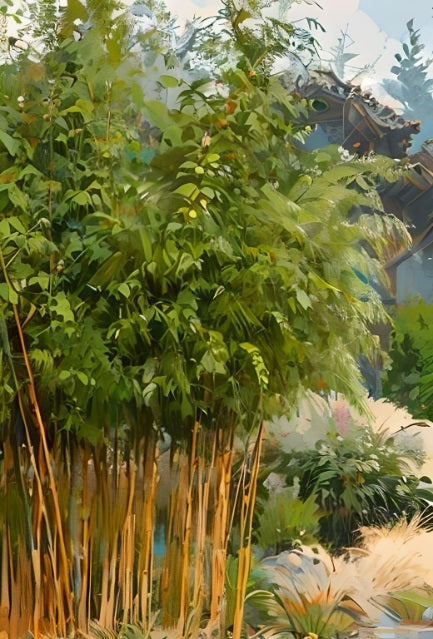When to Germinate Bamboo Seeds
In this article:
- Germinate bamboo seeds any time of year
- Planting young bamboo outdoors in cold season climates
-
Planting young bamboo outdoors in temperate/tropical climates
General Timelines for Planting Young Bamboo Grown from Seed
Regardless of your location, bamboo seeds can be germinated any time of year in controlled environmental conditions. For geographic locations subject to a cold season with frost/freeze, Winter is an optimal times to germinate bamboo seeds for well-developed bamboo seedlings ready to plant the following Spring and Summer.
For those in the Northern Hemisphere, winter is a preferred time to begin germinating bamboo seeds. Most varieties will grow and develop into young bamboo plants of appropriate size for planting outdoors in Spring after all risk of frost or freeze. Bamboo undertakes accelerated growth during Spring and Summer growing seasons, so starting bamboo in controlled conditions for germination and early growth during the Winter months is perfectly timed to take advantage of the transition to optimal outdoor conditions during the warm seasons.
We germinate bamboo seeds throughout late Fall and Winter, easily achieving optimal growth and development indoors (with the added benefit of enjoying vibrant bamboo greenery indoors during the gray slog of Winter!), and with little effort and expense have racks full of healthy young bamboo plants ready for planting during the more hospitable warm seasons when spending time gardening is more a joy than a chore.
Young developing seedlings should be incrementally exposed to increasingly more natural growing conditions to prepare them for the eventual full transition to the outdoor environmental conditions and seasonal fluctuations and changes characteristic for your growing zone. The brief highly controlled seed germination environment should gradually transition to more natural soil, nutrients, temperature, and lighting for growing seedlings.
For optimal results, bamboo seed germination requires consistently balanced temperature, moisture, and oxygen. These critical elements are best managed in a controlled indoor setting during the initial stages of seed germination and young seedling development. (Please see Germinating Bamboo Seeds.)
Transitioning Young Bamboo Plants Outdoors
After germination, the timeframe for transitioning from indoor controlled conditions required for germination to continued growth and development in outdoor naturally seasonal conditions varies by geolocation and the characteristic climate for that location; site specific environmental growing conditions, care, and maintenance; and the recommended growing zone for each species that best mirrors natural habitat and genetic growth characteristics and traits.
When to Plant Young Bamboo Plants in Cold Season Zones
For regions subject to seasonal frost/freeze, it’s recommended to plant young bamboo plants directly into the ground after they’ve attained 12” in height, and are not at risk of frost/freeze. For earliest Spring planting, bamboo seeds are optimally germinated throughout Fall and Winter to produce young plants with well-established growth and vigor to transition outdoors.
For locations with seasonal frost/freeze, plan in-ground planting from Spring through Fall before first frost/freeze and after the young plants are at least 12” high. Most bamboo attain suitable height within 3-4 months following germination.
Alternatively, young bamboo plants can be planted in somewhat more protective outdoor containers before they have attained 12” in height, and managed with consistent balanced moisture and sufficient protection against direct sunlight and environmental hazards. Depending on your location, you may need to provide additional protections for containerized young bamboo plants in the event of temperature extremes exceeding the recommended ranges.
Anticipate container planting before first frost/freeze and ensure protective, controlled environmental conditions as the bamboo plants mature and develop. Planting in pots or containers can occur 2-3 months following germination, and sometimes sooner if the containerized young plants will be fully shielded from challenging environmental conditions, such as winterization to protect against early Spring overnight cold temperatures or sufficient shading to protect against excess midday solar exposure.
When to Plant Young Bamboo Plants in Temperate/Tropical Zones
For more temperate and southern latitudes without seasonal frost/freeze, young bamboo plants can be planted in the ground or in containers when both daytime and nighttime temperatures are conducive to continued growth and development out of doors, and with proper protections against excess solar exposure, extreme heat, and/or insufficient moisture.
For locations without seasonal temperatures below freezing, there is greater flexibility in timing both in-ground planting and container planting, with close attention paid to protecting young plants against over-exposure to direct sunlight, excess ambient heat, and inadequate moisture. In warmer climates, young bamboo seedlings of species that are zone appropriate can be incrementally exposed to outdoor conditions much earlier, often within the first month after germination.
Young bamboo plants will optimally thrive and mature in outdoor temperature ranges and other conditions sufficiently mirroring their natural habitat and recommended planting zone. Always adequately protect young bamboo seedlings and plants from full sun, especially intense mid-day sunlight at its peak, and provide sufficient moisture to compensate for fluctuating ambient environmental conditions.
Summary
In summary, bamboo seeds can be germinated in controlled conditions at any time of year. The time required to fully transition them to planting outdoors depends on a variety of factors, many of which are influenced by your specific growing zone and associated conditions. Generally speaking, bamboo seeds can be germinated at any time, with subsequent outdoor planting in northern latitudes from Spring through Fall, and in any season in southern latitudes without risks of frost or freeze.
Please refer to Germinating Bamboo Seeds in our Resource Library for our recommended germination process and guidelines.
080225
Collections
-

All Bamboo Seeds for Sale
Welcome to our catalog of bamboo plant seeds for sale including clumping...

